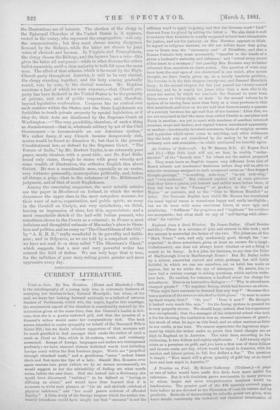CURRENT LITERATURE.
Fixed as Fate. By Mrs. Houston. (Hurst and Blackett.)—This is the autobiography of a young lady who is extremely desirous of marrying her brother-in-law, General Mereilyth ; but when, at the end, we leave her looking forward anxiously to a talked-of autumn Session of Parliament, which will, she hopes, legalise this marriage, the sentimental aspect of the situation is considerably marred by the intimation given at the same timo, that the General's health is deli- cate, that she is a poorly-endowed girl, and that the pension of a General's widow would make her comparatively rich. The book seems intended to excite sympathy on behalf of the Deceased Wife's Sister Bill ; but we doubt whether supporters of that measure will be much gratified to find amongst their ranks the author of such a work as Fixed as Fate, which is ill-written, weak, and carelessly corrected. Scraps of foreign languages and italics are interspersed profusely; we have counted sixteen italicised words (not including foreign ones) within the first fourteen pages. Words are "propelled through clenched teeth," and a gentleman "rains" ardent kisses thick and fast upon the lips of a lady. Should Mrs. Houston over again venture into print (which we by no means recommend), we would suggest to her the advisability of finding out what words mean, before she uses them. Had she looked into a dictionary, she would have discovered " redolent " to be defined as "having or diffusing an odour," and would have thus learned that it is nonsense to write such phrases as "his air and attitude redolent of physical indolence," and " her small person redolent of offended dignity." A little study of the foreign tongues which the author con- stantly introduces would have taught her that " cancans " is not the ordinary word to apply to gossip, and that the German word " Lied" does uot form its plural by adding the letter R. We also think it well to mention that Aristides is usually supposed to have been remarkable for justice, and not for jealousy, as Mrs. Houston appears to think. In regard to religious matters, we did not before know that going over to Rome was the " customary end " of Ritualists ; and that a Roman Catholic lady must necessarily " transfer to the bands of a priest a husband's authority and influence," and "reveal every secret of her heart to a stranger ;" but possibly Mrs. Houston may be better informed than ourselves on these poiuts. The question of what may have been the real ages of the characters' is one which, after severe thought, we have finally given up, as a totally insoluble problem. The heroine is in the first chapter twenty-one, and General Merodytla forty ; in the second chapter she has just passed her twenty-second birthday, and lie is nearly ten years older than a man who is six years her senier, by which we conclude the General to have been thirty-seven or thirty-cight, at most. In the second volume he is spoken of as having been more than forty at a time previous to that first mentioned, and later on we are told that there is nearly a quarter of a century between his age and that of the heroine ! After this, we are not surprised to find the same man called Charlie in one place and Percy in another; nor yet to meet with, numbers of needless inverted commas, stops and dashes, and capital letters, introduced apparently at random ; inextricably-involved sentences, hints of weighty secrets and mysteries which never come to anything, and other evidences that the book was not considered by the author to be worthy of ordinary care and attention,—in which senthnonE we heartily agree.


































 Previous page
Previous page